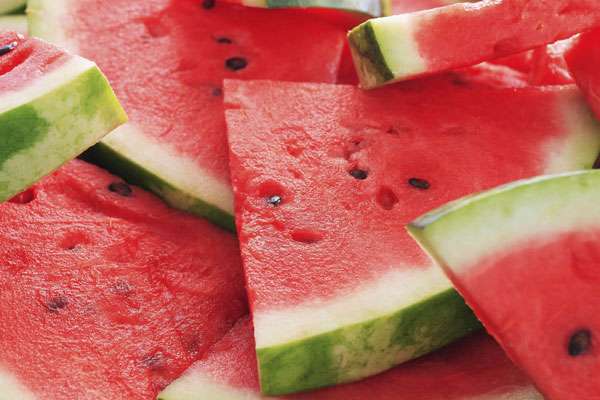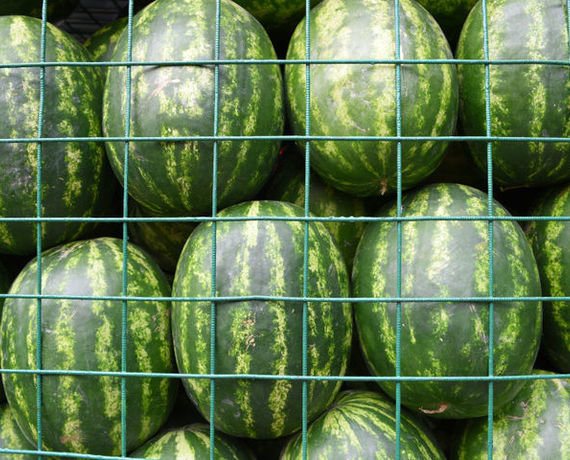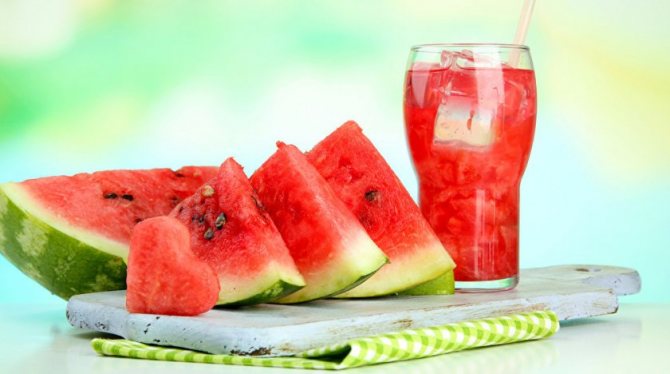Is it possible to eat watermelon for gastritis with high acidity?
Nutritionists do not prohibit eating the fruit during remission of the disease or weakening of its symptoms. During the acute phase of gastritis with high acidity, watermelon is completely excluded from the diet.
For gastritis with low acidity, it is allowed to eat several small slices per day.
Points for and against
Watermelon saturates the body with useful substances and improves the functioning of the excretory system. This is important for various problems in the functioning of the gastrointestinal tract, including gastritis.
The berry contains ascorbic acid and other compounds that irritate the mucous membranes. With increased gastric acidity, the diet should be as gentle as possible, and in the acute phase of the disease, even a small amount of acid increases the pain.
In the remission stage, the gastric mucosa is no longer irritated. Regular foods are gradually introduced into the diet. The goal is to return the stomach “to function.” At this stage, watermelon juice will not harm, but do not drink it in large quantities so as not to worsen the condition.
Advantages and disadvantages of this fruit

If there are “problematic” stomach or intestines, the patient will feel heaviness, pain and other unpleasant sensations in the abdomen. The most important advantages of watermelon are:
- high content of vitamins B, A and E;
- it contains fructose, so it is allowed for people suffering from diabetes;
- has a high diuretic effect;
- high content of potassium and magnesium;
- contains a huge amount of antioxidants.
Potassium and magnesium ions are very useful for people with circulatory disorders in blood vessels, high blood pressure, and heart problems. Thanks to magnesium, the level of bile excretion from the body increases and the amount of cholesterol in the blood decreases. It is very useful for heart patients, as it improves the full functioning of this organ. If you eat watermelon in reasonable quantities, then no negative effect on the body will occur. Another positive point is the rapid digestion and elimination of this berry. Watermelon is often recommended for people suffering from various kidney diseases. You need to remember that you need to eat it without reaching the crust, that is, only the core. It is the peel that contains a high amount of nitrates, which can cause not only stomach pain, but also have a toxic effect.
Eating watermelon for gastritis with high acidity
In the stage of remission or when acute inflammation subsides, it is recommended to eat the fruit in moderation and in small portions. In order not to harm digestion, choose berries that are completely ripe and as sweet as possible.
Properties
What makes watermelon special is its sugar composition. Its pulp stores healthy and simple fructose, which is absorbed faster than other sugars and minimally irritates inflamed tissues. Therefore, eating watermelon for gastritis is more acceptable than other fruits, the sweetness of which is responsible for glucose.
Benefits and harms
Watermelon is useful for gastrointestinal pathologies because:
- improves microflora;
- activates metabolic processes;
- reduces general gastrointestinal acidity;
- removes toxins from the body;
- lowers cholesterol levels;
- enhances intestinal motility;
- strengthens the cardiovascular system;
- enriches the body with B vitamins;
- helps to get rid of excess weight;
- has antioxidant and anti-inflammatory properties.
However, when consumed frequently and in large quantities, watermelon causes:
- allergic reactions;
- impaired renal and excretory function;
- poisoning of the body;
- indigestion.
How does it affect the stomach?
Eating fruit always causes an increase in acidity. This is due to their composition: acids, complex sugars, fiber. Fruits actively stimulate taste buds, which increases the amount of hydrochloric acid produced by the stomach.
Attention! Some nutritionists recommend eating berries on an empty stomach or as a separate meal to cleanse the body. This cannot be done with hyperacid gastritis.
With increased acidity, even without signs of inflammation, excessive consumption of the same watermelon can cause heartburn. The effect will be stronger if you eat several slices on an empty stomach. This is especially not recommended for erosive gastritis at any stage.
Moderation is the key to health
No matter what, true watermelon poisoning is not that common. A very common situation is when all family members eat berries, but only one of them, mainly the child, has a stomach ache. Why is this happening?
Watermelon is a fruit that is more than 85% liquid. Satiety when consuming this product occurs much slower and later than after meat or fatty foods. This is where the insidiousness of this melon crop lies, since the stomach can accommodate large volumes of contents, but the same cannot be said about the intestines.
When a person eats many pieces on an empty stomach, its juice almost immediately enters the small intestine and literally bursts it from the inside. Children love this delicacy very much, but their intestinal capacity is much less than that of adults. It is for this reason that very often a child has a stomach ache after eating watermelon.
What to do in such a situation? If, apart from pain and a feeling of heaviness in the abdominal cavity, there are no other symptoms, then most likely they were caused by banal overeating. It will go away spontaneously within 1-2 hours, and to speed up the absorption of food, you should walk a little. You should not go to bed with a full stomach, as this has an extremely negative effect on the condition of the upper gastrointestinal tract.
How to properly use watermelon when you are sick
It is allowed to include the fetus in the diet only during long-term remission. In the presence of other gastrointestinal pathologies (for example, pancreatitis), the berry is prohibited.
Nutritionists consider only the pulp from the center - the sweetest - suitable for consumption. The layers that lie closer to the crust are often filled with nitrates and their derivatives. These substances are harmful to the body as a whole, and in case of gastrointestinal diseases, they further burden it.
Norms
The main rule: everything should be in moderation . Even during the period of remission of gastritis, do not be greedy: kilograms of watermelon eaten will only harm a weakened stomach. Often the pain and feeling of heaviness from such a diet return.
The daily allowance allowed by doctors should not be higher than 500 g. Ideally, eat 2-3 slices per day. This will speed up recovery and will not cause aggravation.
Attention! Do not eat watermelon on an empty stomach: it causes pain and bloating. It is better to eat the fruit as a dessert.
There is an opinion that for any gastritis, even hyperacid, a little watermelon can be consumed. If you really want it, there is no acute pain and the sweet piece from the center of the fruit does not weigh more than 150 g, you can eat it and evaluate your well-being.
Persistent heaviness in the stomach, belching, heartburn, dryness and bitterness in the mouth or pain are signs that it is better to wait for a stable remission.
Tips and tricks
In case of gastrointestinal diseases, the patient is required to follow the general recommendations and special prescriptions of his attending physician . A preliminary examination, correct diagnosis and treatment and preventive prescriptions will help alleviate the condition and increase the period of remission.
In addition, the patient himself must make a significant contribution to successful treatment by radically changing his habits and lifestyle.
- Give up bad habits: excessive drinking of alcohol and smoking.
- Eliminate fast food, fatty, fried, smoked and canned foods from your diet. Meals should be regular, in small portions. It is recommended to steam, bake or boil food. The temperature of the cooked dish should not be too hot or cold. Eat, chew thoroughly, giving preference to grated or finely chopped foods. Mayonnaise is also prohibited.
- Physical activity should be regular, but not excessive. Swimming, walking, and cycling are useful.
- Taking medications must be coordinated with your doctor to reduce the risk of exacerbation of gastrointestinal diseases.
Adhering to certain rules, following the recommendations of doctors will significantly improve your well-being and ensure the success of treatment , as well as speed up the recovery process.
On our website: Oatmeal and oatmeal cookies for gastritis - are there any benefits?
Watermelon for gastritis with high acidity during remission
Even in the remission stage, you cannot overload the stomach. Doctors advise eating frequently and in small portions, even if there are no signs of indigestion.
For gastritis of the stomach, it is recommended to consume watermelon no more than once a day, up to 2 slices.
In chronic form
With chronic gastritis with high acidity, any violation can cause an exacerbation, especially if you repeatedly violate the diet.
Watermelon is allowed and healthy, but in moderation. It is not the mere fact of eating the berries that will bring the disease into the acute phase, but rather the large amount of food eaten.
In acute form
For acute gastritis, watermelon, like other fresh berries with a high content of acids, fiber and sugars, is contraindicated . This rule applies until the symptoms disappear.
This is interesting:
Can you eat watermelon if you have type 2 diabetes?
How to eat watermelon for cystitis: how much you can eat during the day
Is it possible to eat watermelon during early and late pregnancy?
Treatment with watermelon
Watermelon will be useful not only for gastritis, but also for stomach ulcers. A healing drink that accelerates mucosal regeneration processes is prepared from berry peels. Ingredients:
- washed watermelon rinds;
- boiling water – 1 l.
The peels must be dried and ground to a powder. Take 5 tbsp per liter of boiling water. l. product. The resulting mixture must be boiled at a minimum boil and constant stirring for half an hour. Then close the lid and wrap in a warm towel, leaving for an hour. Before use, filter the drink and drink 1 glass before meals.
Since split meals up to 6 times a day are recommended for gastritis, during the day the patient should drink at least 6 glasses of a drink made from dry watermelon rinds.
In what cases is the fruit contraindicated?
In order not to harm the body, watermelon is prohibited in the following cases:
- acute gastrointestinal diseases and exacerbations of chronic pathologies;
- simultaneous occurrence of several digestive diseases (no matter at the stage of exacerbation or remission);
- stones in the kidneys or ureters (the berry often provokes the movement of stones);
- acute dysfunction of the digestive system, especially with nausea and diarrhea.
Precautionary measures
To avoid problems after eating watermelon, it is important to choose it correctly:
- The best berries are sold in Russia from mid-August to mid-September. At other times they are often unripe and with chemicals.
- A ripe watermelon makes a loud cracking sound when pressed. If this is not the case, the fruit is most likely green or has been brought to ripeness artificially.
- If you place a piece of pulp in water, it does not turn pink or reddish, but simply becomes cloudy. Coloring is a sign of high nitrate content.
- The cut flesh does not have sharply visible veins or inclusions of grains of sugar.
- If the veins are pale or yellowish, it means that the berry has been treated with chemicals more than once.
Watermelon slices or halves can be stored for no more than 2 days in the refrigerator, wrapped in cling film.
Berry and peptic ulcer
Many patients suffering from gastrointestinal diseases are interested in the question of whether it is possible to eat watermelons if they have stomach and duodenal ulcers. This product is present in the patient’s diet during remission, but in small quantities and after consultation with a doctor.
People suffering from peptic ulcers can only eat fresh, raw fruit. Any canned, pickled fruits, watermelons in sweet syrup are prohibited.
During exacerbations of ulcers and after surgery, sweet berries should be avoided. It contains fructose and plant fiber, which can cause irritation to inflamed mucous membranes.

Stomach ulcer
Watermelon for ulcers is allowed in minimal portions during remission. The berry contains a huge dose of vitamin C, which has an irritating effect on inflamed stomach walls.
When exacerbating, the pulp can provoke sharp painful spasms and even bleeding of the walls. If a stomach ulcer is combined with gastritis, the product will have to be completely abandoned.
Duodenal ulcer
The use of watermelon for duodenal ulcers is allowed, but in the form of freshly squeezed juice diluted with still water. This is due to the fact that berry pulp contains a lot of plant fiber and dietary fiber, which can place increased stress on the inflamed walls of the stomach. In watermelon juice, their levels are reduced, so it can be consumed in diluted form.

Is it possible for other gastrointestinal problems?
For gastritis with low acidity, watermelon is not prohibited, but beneficial. However, it is not recommended to overeat: no more than 3 slices per day and not at one time.
If a person has an acute phase of inflammation and the diet is strictly gentle, it is better to abstain from the fruit.
For ulcers
Many doctors believe that during periods of exacerbation of gastric and duodenal ulcers, watermelon should not be eaten because it stimulates the production of hydrochloric acid. Ingestion of the fetus often greatly worsens the patient's condition.
During the remission stage, watermelon is allowed, but only as a dessert, on a full stomach and in small quantities. In stable remission, it is allowed to eat up to 2 slices per day.
For pancreatitis and cholecystitis
Is it possible to eat fruit with pancreatitis? Patients are allowed it only in fresh form and at the stage of remission.
Attention! If inflammation of the pancreas worsens, the berry will do harm. Even its one-time use in small quantities causes severe pain, heaviness, and increases the load on the diseased organ.
With cholecystitis, the fruit is eaten exclusively during the period of remission. Be sure to eat in small portions and fractionally, do not eat more than 250 g at a time.
If there are stones in the gall bladder, it is undesirable to eat watermelon: due to its choleretic properties, stones can begin to move along the ducts and clog them.
How to understand that it is poisoning
Food poisoning that occurs after eating watermelon is not uncommon. Although in most cases it goes away on its own within a couple of days and even hours, in the summer doctors in infectious diseases hospitals constantly have to deal with such cases.
The following symptoms indicate that you have been poisoned by poor-quality watermelon:
- Cutting pain in the abdomen, often near the navel and below;
- Nausea occurs and vomiting often occurs;
- Diarrhea developed;
- Body temperature has increased.
Intestinal poisoning is caused by microorganisms that entered the fruit during improper storage. Note that these symptoms do not arise due to nitrates, pesticides and other substances that are so frightening to everyone on TV.
First aid for abdominal pain after watermelon, which is accompanied by the clinical manifestations described above, is activated carbon or another intestinal adsorbent (for example, Enterosgel). These drugs will collect all the toxic substances and remove them outside the body. In case of vomiting and diarrhea, it is imperative to monitor the replenishment of the water balance so that dehydration does not develop. In most cases, poisoning goes away on its own within 1-2 days.
To normalize digestion after poisoning, it would be good to take a course of Pankrenol ( Official Store )
Consult a doctor if the victim’s condition worsens hourly, unbearable abdominal pain appears, the person is lethargic, drowsy, a rash appears on the skin, or other alarming symptoms develop.
Can pregnant women eat watermelon: arguments for and against
All this is true and all this is very relevant during pregnancy. But there is another side to the coin. This is the quality of the watermelons eaten. And here everything depends on several points.
- Such bad watermelons, when tapped on the surface, make a muffled sound, like a deflated ball (and not like a hollow container).
Watermelon is a very healthy delicacy during pregnancy; it can be consumed if there are no health contraindications. Watermelon consists mostly of water and contains easily digestible sugars, but despite this, it has 38 kilocalories per 100 grams of fruit pulp. True, lovers consume it in kilograms, so the kilocalories increase in proportion to what they eat. Watermelon has a high glycemic index, which means that such a low-calorie product can increase appetite, and for pregnant women you need to monitor weight gain, and there is no need for extra pounds.
By consuming watermelon during pregnancy, a woman replenishes her body with useful substances: pectin, magnesium, sodium, potassium and phosphorus, as well as vitamins: carotene (provitamin A), thiamine (B1), riboflavin (B2), vitamin PP, ascorbic and folic acid. The beneficial elements of watermelon pulp have a beneficial effect on the cardiovascular system, hematopoietic and digestive organs, promote the elimination of cholesterol, and have choleretic and diuretic properties. Therefore, if you have kidney stones or coarse sand, you need to use watermelon very carefully, and if you have small sand, you can clean your kidneys. Both tasty and healthy.
You should use watermelon carefully during pregnancy if there is swelling. On the one hand, it is a diuretic, but if there is swelling, it is better to consult a doctor; it may be that the kidneys are not coping and urgent hospitalization is needed. Even a healthy pregnant woman should understand that the load on the bladder is high due to the growth of the abdomen and the pressure of the uterus, pregnant women often go to the toilet, and if you eat watermelon, it is better not to go far from home.










